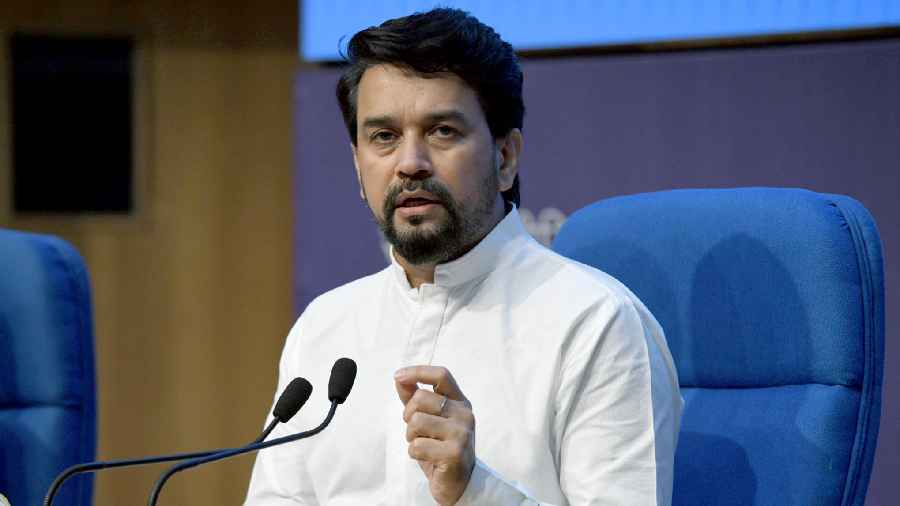Union Information and Broadcasting Minister Anurag Thakur has said the Indian media is strong enough and has the capability to set narrative across the world.
Some foreign media houses carried "false" reports about India during the COVID-19 pandemic, and this agenda of spoiling the country's image was not only being run from outside the country, but many Indian leaders used that opportunity for their self-interests, Thakur alleged on Sunday.
He said Indian media was independent in the past and will remain so in the future as it is today.
Thakur was speaking at the Lokmat National Media Conclave on the topic 'Is Indian Media Completely Polarised?' The media conclave was organised to mark the birth centenary of freedom fighter and Lokmat Media Group's founder editor Jawaharlal Darda, fondly known as 'Babuji', as well as the golden jubilee of the Lokmat Nagpur edition.
Addressing a gathering of journalists and intellectuals, Thakur said, "On part of the government, I can assure that Indian media was independent earlier, it is independent today and will remain so in future also." "It is nobody's intention to nail someone. But a question arises when some political parties use a huge proportion of their budget for their own welfare and self-praise rather than for the development and welfare of people. The effect of all this is sometimes seen in news reports, when eight to nine newspapers carry identical headlines and it happens not once but 50 times," he said.
Thakur attacked some foreign media houses for their coverage during the COVID-19 pandemic, saying dead bodies flowing in the Ganga river and lying on its banks were shown in reports.
"These reports were not true, but a large number of media houses without checking facts ran those reports. This does not spoil only one person's image, but spoils the image of the entire country. And this agenda and propaganda is not only being run from outside the country, but many leaders from India also used this opportunity for their self-interests," he said.
During the pandemic, some political leaders raised question marks over Indian anti-coronavirus vaccines, the minister said.
"I am not questioning their thinking, but questions arise whether they were doing this for political benefits or marketing for some foreign company," he said.
Thakur praised Prime Minister Narendra Modi for introducing two Indian anti-coronavirus vaccines and providing 220 crore doses for free in the country.
"Did anyone discuss those news reports which claimed that crores of people will die in the country (during COVID-19) and its economy will suffer?" he asked.
"Someone said during the conclave that narratives in India are set by foreign countries. But, however they (foreign countries) may try, our actions speak for themselves and they were proven wrong. Their narratives did not affect us," he said.
He dubbed as "wrong" the questions raised (by Delhi Chief Minister Arvind Kejriwal) over the educational qualification of PM Modi.
"In 2016, senior BJP leaders had given information about the educational degrees of PM Modi. But this issue was raised in 2023 and the media started showing it again without checking and researching that the information about it was given in 2016 itself," he said.
Media shows a mirror to the society and the government, but the media should also be responsible for keeping the mirror clean, Thakur said.
Speaking on the claims about foreign media setting narrative in the country, he said, "On the contrary, the Indian media is strong enough and has the capability to set the narrative all over the world." On the occasion, Chairman of Lokmat Media's Editorial Board and former Rajya Sabha member Vijay Darda said questions were being raised whether media was able to fulfil its responsibility as the watchdog of the society.
"The electronic media is in the dock especially due to allegations regarding biased political coverage," he added.
Darda said while every media house has its own viewpoint, there should be a difference between this and bias.
"When the government does something praiseworthy, praise it and vice versa. Mostly media houses are fair, but a few are bringing a bad name to the media industry," he added.
Except for the headline, this story has not been edited by The Telegraph Online staff and has been published from a syndicated feed.











